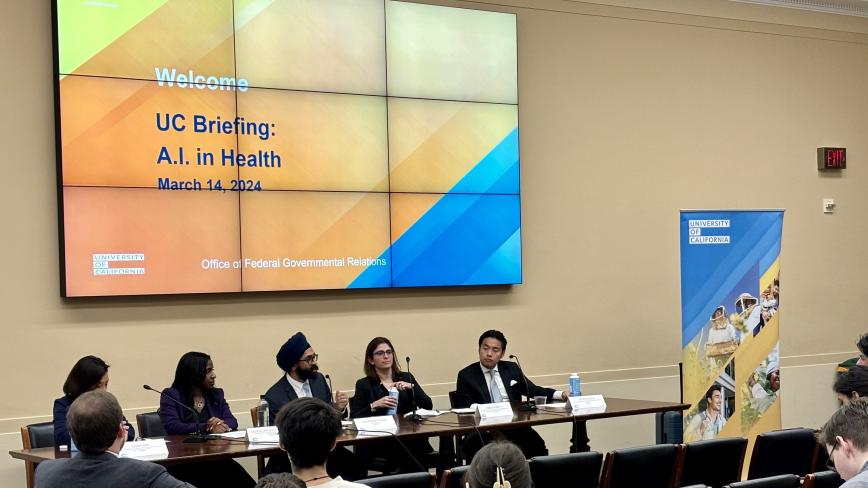Artificial intelligence (AI) is rapidly reshaping the health care landscape. From biomedical research advancement to improved health care delivery, AI promises a host of health care innovations.
The University of California recently held a briefing on the intersection of AI and health as part of a series of Congressional briefings designed to help policymakers understand the opportunities and challenges of this emerging technology. Among the key topics that UC experts emphasized as critical considerations are the need for governance that focuses on transparency of use, along with inclusivity in the development process to ensure representation of all populations, especially those that have been historically marginalized in health care.
The briefing, held March 14 in Washington, D.C., connected Congressional staff with experts from across the University of California’s academic health centers to discuss the promise and potential perils for patients as AI becomes incorporated into the U.S. health care system.
The formation of the bipartisan Congressional Task Force on Artificial Intelligence – which is focused on AI’s applications and will develop a report for governing the use of AI – speaks to the immediate need for understanding how to navigate the evolving technology.
“AI has the potential to change our lives for the better, and we are excited to work together as the chair and co-chair of the recently launched Bipartisan Task Force on Artificial Intelligence, along with other Members of the Task Force, to help Congress ensure America leads the way with AI innovation and safeguards,” said Task Force on Artificial Intelligence Chair Jay Obernolte (CA-23) and Co-Chair Ted Lieu (CA-36). “The University of California's Health and AI briefing is an excellent example of how we can harness our collective strengths and learn from one another as we continue to explore what a world with AI looks like.”
The briefing was moderated by Cora Han, J.D., chief health data officer and executive director of the Center for Data-driven Insights and Innovation at the University of California Health. A panel of UC faculty provided expert insight on the convergence of health care and AI. Speakers included:
- Medell Briggs-Malonson, M.D., Chief of Health Equity, Diversity and Inclusion & Associate Professor of Emergency Medicine, UCLA Health, and co-chair of the U.S. HHS Health Information Technology Advisory Committee (HITAC)
- Peter Chang, M.D., Director for Applied AI Research (UCI Institute for Precision Health) and Associate Professor in Radiological Science, Pathology, and the Donald Bren School of Information & Computer Sciences, UCI Health
- Sara Murray, M.D., M.A.S, Vice President & Chief Health AI Officer, Associate Chief Medical Information Officer and Associate Professor of Clinical Medicine, UCSF Health
- Karandeep Singh, M.D., M.M.Sc., Chief Health AI Officer & Joan and Irwin Jacobs Endowed Chair in Digital Health Innovation, UC San Diego Health
Takeaways for policymakers and health care leaders to consider when navigating a rapidly evolving AI landscape:
- Employ AI responsibly: There are many potential benefits from the uses of AI in health, but technology developers and health care providers need to be thoughtful about how their decisions impact the safe, ethical and equitable delivery of care. When built correctly, patients and providers can be more informed, and lives can even be saved through AI. However, providers need to carefully evaluate and monitor the tools they are using to ensure that they are providing the benefits they claim. It’s also vital to protect patient privacy and keep health data secure throughout the AI lifecycle.
- Ensure adequate transparency: when we talk about transparency in AI, what does that mean and what does that look like for both the health system and the patient? Providers should have information available to them about how and in which populations AI tools were tested, what the test outcomes were, and what information AI tools rely on when generating predictions. It is also important that patients understand how their data are being used and how decisions made by AI tools may impact them.
- Create governance: Governance involves having robust processes around how AI tools are vetted to ensure trustworthiness. This can be challenging when vendors want to keep technology proprietary for competitive reasons.
- Develop equitable and inclusive tools: When data that is put into tools is not representative of the people it is used for, it has limited usefulness. There can be harmful implications if populations have been excluded from AI models, including perpetuating – rather than closing – health inequities. Developers of AI tools have to be inclusive in order to have an equitable impact, especially for populations that have been historically marginalized, like people of color, women and people with rare and complex conditions.
At the briefing, UC Health’s AI leaders offered to collaborate closely with policymakers in the months and years ahead as they grapple with the promise and potential perils of health AI implementation, governance and transparency.
UC Health AI experts also met with leaders of the U.S. Department of Health and Human Services AI Task Force as well as the White House staff responsible for implementing the President’s Executive Order on the Safe, Secure, and Trustworthy Development and Use of Artificial Intelligence.
“The use of AI tools in health care has enormous potential to benefit both providers and patients, as well as improve the delivery of care,” added Han. “At the same time, these tools need to be developed and deployed responsibly, and there are important considerations around fairness, transparency, safety, privacy and security, and ethics for policymakers to consider when thinking about appropriate guardrails.”
About University of California Health
University of California Health comprises six academic health centers, 20 health professional schools, a Global Health Institute and systemwide services that improve the health of patients and the University’s students, faculty and employees. All of UC’s hospitals are ranked among the best in California and its medical schools and health professional schools are nationally ranked in their respective areas.

